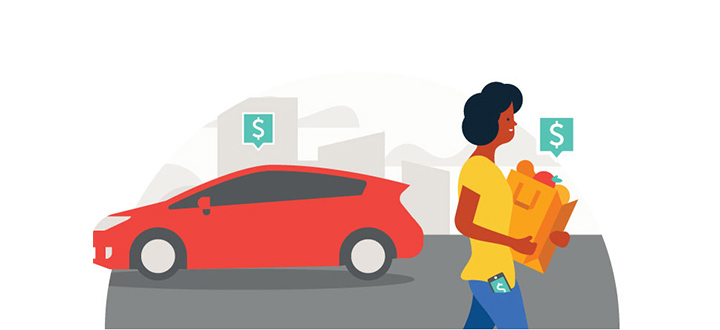
First-Time Homebuyer Guide: Steps in the Process
A successful home purchase requires more than a dozen steps from start to finish. Learn more before you attend open houses or apply for a mortgage.
Buying a home looks so simple on popular TV shows. However, crafting a compelling show means leaving out many real-world steps.
Here is the step-by-step process for buying a home, including preparation, selection, and closing, plus tips to consider for first-time buyers. Each of the 16 steps is necessary for being a prepared and confident homebuyer. Some steps take more time or effort to complete than others — but the payoff is worth it when you're living in your first home.
1. Learn Home-Buying Terms
For first-time home buyers, the language of home buying — like ARM, APR, PMI, seller's agent and buyer's agent — can feel overwhelming. Become more familiar with a mortgage glossary before getting in too deep. Ask for more information and get ready to search for words if you don't understand a new acronym or term. It will empower you and help you become a savvy shopper.
2. Determine How Much Home You Can Afford
Many first-time homebuyers worry about getting in over their heads with a loan. It's a valid concern. Buying a home with unsustainable monthly payments can lead to serious problems.
So, what's included in a home payment? Most monthly payments include the following:
- Principal: The balance of the home loan amount owed.
- Interest: The rate charged on the loan amount. It's crucial to compare mortgage rates to get the best deal.
- Property taxes: You'll typically pay this directly or to your lender as part of your monthly payment in escrow.
- Home insurance: You'll typically pay the homeowner's insurance company directly or to your lender as part of your monthly mortgage payment in escrow.
Other home ownership expenses after buying a house can include:
- Private mortgage insurance: Your lender will usually require this with your recurring mortgage payment if your down payment is less than 20%.
- Homeowners' association fees: Charged to homeowners in communities with an association, these fees might pay for shared maintenance, recreational facilities and landscaping.
- Home maintenance costs: These include unexpected repairs or planned renovations.
Find out what's affordable based on your financial situation, create a budget for future homeownership and stick to it. Plug your budget numbers into BECU calculators to explore how much home you can afford, based on your income, and see the associated monthly payment ranges.
3. Add Up Home-Purchase Costs
On top of your monthly mortgage payments, you'll need to come up with money for the following one-time expenses:
- Earnest money: When making an offer, a buyer pays 1%-5% of the home's purchase price. If the offer is accepted, the earnest money deposit applies toward the down payment.
- Down payment: Most lenders require at least 3% of the sale price as a down payment.
- Closing costs: Your closing costs could include fees for the home inspection, the home loan, an appraisal of the home's value and other expenses. For buyers, the average closing costs are up to 3% of the loan amount.
- Prepaids and escrow reserves: These are costs paid by the buyer in advance to cover expenses like homeowners' insurance and property taxes.
- Moving expenses: Moving into a new home can add up, whether you're headed across town or the country. You might need packing supplies, like boxes, box inserts and tape, maybe a truck rental and hired help if you can't do it yourself.
- Living expenses: Your new home might have higher electricity, natural gas and garbage bills, and you might need money to set up your new house — particularly if you need to buy furniture.
4. Stash Your Cash
Once you've estimated how much you need to buy a house, consider ways to save money. Although mortgage interest rates are running high in 2024, so are savings rates — good news for those who plan to buy in several years.
A certificate of deposit (CD) can help you earn interest as you build your housing nest egg. You can continue to earn that rate if you don't withdraw the money early.
5. Check your Credit Report
Your credit report is a record of how you've managed your debts. A good credit history can help you get better home loan interest rates — and lower rates save you money on how much you pay over the loan's life.
Check your credit reports with Equifax, Experian and TransUnion for free at annualcreditreport.com. Then, work on correcting any errors and reducing your debt levels. Lenders often weigh your credit card debt when they evaluate your mortgage application.
Also, avoid opening new credit accounts in the months before a home purchase — they could impact your credit score. Review more credit-boosting tips before buying a home.
6. Research First-Time Homebuyer Programs and Grants
Government agencies, nonprofits and financial institutions may offer first-time homebuyer grants and programs to encourage homeownership. These programs may include assistance for your down payment, loan and closing costs.
For example, first-time homebuyers applying for a BECU loan can receive a $250 coupon toward closing costs. To get the coupon, you must attend a live seminar or webinar.
7. Compare Home Loans, Mortgage Lenders and Closing Costs
Compare mortgage lenders and mortgage rates, or the interest you'll pay on the amount you borrow. Ask about the minimum credit score required to get a loan, any other qualifications, and the estimated closing costs.
Mortgages are likely available from your current credit union or bank, but it's wise to shop around. You could save up to $1,200 per year by shopping around for a home mortgage loan. Or you can use a mortgage broker, who may have access to loans from different lenders.
Try to compare at least three lenders on home loan products, including fixed-rate mortgages, adjustable-rate mortgages, FHA loans and VA loans, if you qualify for those.
8. Collect your Application Materials
The lender will ask you for personal and financial information for the home loan application process, likely including:
- Proof of income, including W2s and pay stubs.
- Tax returns.
- Bank statements.
- Social Security number.
- Identification.
- Documentation regarding the source of your down payment cash, such as account statements.
Each lender's application packet may differ slightly. Ask specifically what you'll need to provide.
9. Get a Prequalification Letter or Preapproval Letter
You can find out how much loan you can likely afford by getting prequalified for a mortgage. A prequalification letter outlines what a lender estimates to be able to lend you based on the information you provide regarding your income, assets and credit check.
Getting preapproved is more involved. To get conditional loan approval, you'll need to submit an application to the prospective lender. The lender will verify your income, assets and credit before making a determination. If you qualify, the lender will issue a conditional approval letter. The letter doesn't guarantee loan funding but does indicate that you're a serious buyer.
10. Choose a Real Estate Agent
Ask friends and family to recommend a good real estate agent. A knowledgeable real estate agent is essential for first-time homebuyers. The agent can help explain and guide you through the house search, home offer and closing process. Some institutions, including BECU, can also help connect you with a licensed real estate agent.
11. Go House Hunting
With your agent's help, get a good sense of the housing market in different cities, suburbs and towns. Then, narrow down the neighborhoods you feel fit well with your budget, family and lifestyle. Compare schools, parks, distance to your workplace and other amenities.
Then, visit open houses and go on agent-led tours for house shopping. Shop within the range of how much house you can afford. There are many factors to consider when shopping for your first home.
12. Make an Offer and Be Prepared To Negotiate
Your real estate agent will compose a written offer for the home, which is legally enforceable. The offer will include a price you're willing to pay, the terms and conditions for your offer, the earnest money you're putting up and when you hope to take possession of the house, among other aspects.
The home's seller may accept your offer or make a written counteroffer. Negotiations may ensue. When the buyer and seller agree to the price, terms and other conditions in writing, you have a legally binding contract.
13. Narrow Down Loan Estimates and Lock in an Interest Rate
Contact lenders you researched to narrow down your loan options. If you aren't ready to submit an application yet, many lenders will provide a loan summary based on your personal information and new details, such as the home address, purchase price and down payment amount. Compare the loans' interest rates, features and fees.
You'll need to submit an application to get a formal estimate and lock your rate. A rate lock lasts a limited time. But once you're reasonably sure about your home purchase date, an interest rate lock protects you from sudden rate increases.
Remember, the higher the rate, the less house you can afford.
Applying for mortgages will trigger credit checks by lenders. Multiple credit checks by mortgage lenders are recorded as a single inquiry — as long as they're all made within a 45-day window.
14. Get an Inspection
Hire an independent inspector to provide an overview of the house's major and minor problems. As a first-time buyer, you may find it challenging to uncover these problems yourself.
You don't want to accidentally strain your budget due to continual, unexpected expenses, particularly with an older home. If you find significant issues, you may be able to negotiate with the seller on the home price or have the seller pay to get the problems fixed as a condition of your purchase.
15. Closing
Closing is the final step in the home-buying process. Leading up to closing, your lender will process your application. This takes some time — an average of 43 days nationally, as of June 2024, according to ICE Mortgage Technology.
But time to close varies, and your lender should work with you to close within the timeframe you negotiate with the seller. On-time closing rate might be something you consider when you're shopping for a lender. (BECU closes more than 97% of all home loans on time or prior to the closing date requested by buyers.)
During this time, your loan officer will review your documents and may ask for additional information for the underwriter. Be available and ready to respond quickly to any lender requests to ensure processing proceeds without delays.
Processing and closing include:
- Appraisal of the home value by an independent appraiser.
- Third-party document preparation, ensuring that the property title transfers according to state law and the terms of the purchase and sale agreement.
- Notarized signing of closing documents by seller and buyer.
- Transfer of money from the buyer to the seller
16. Get Your Keys to Your First Home
Your real estate agent will typically get all the keys from the seller's agent and arrange a time to give them to you. Finally, it's time to walk through the door. Congratulations! You've bought your first home.
A Final Word About First-Time Homebuying
Preparing to buy your first home can be stressful and overwhelming. Thankfully, many professionals can help walk you through each step.
Approach the process with patience and time. Don't feel pressured into applying for a home loan, going house shopping or signing a contract. Instead, go slowly and plan for the next few steps in advance when possible. Ask lots of questions — and keep asking until you feel like you understand the answer.
Resources
The above article is intended to provide generalized financial information designed to educate a broad segment of the public; it does not give personalized financial, tax, investment, legal, or other business and professional advice. Before taking any action, you should always seek the assistance of a professional who knows your particular situation when making financial, legal, tax, investment, or any other business and professional decisions that affect you and/or your business.






